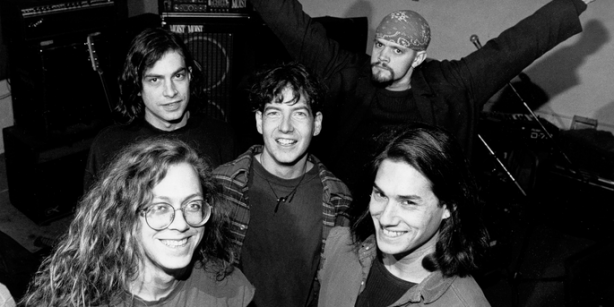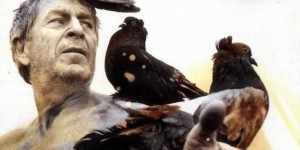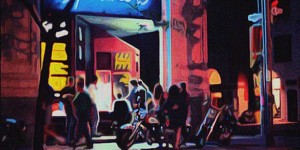 Music
Music
Confessions of a '90s Canadian music fan
by Caitlin Hotchkiss
April 9, 2014
When I was 22, I picked up a copy of Caroline Sullivan’s Bye Bye Baby: My Tragic Love Affair with The Bay City Rollers. My roommate at the time took one look at it and said, “Someone stole your life story!”
For four years I lived for them. It’s not a pretty story.
As soon as I read that line on the back cover, I had to take a deep breath and light a cigarette before going any further. Eight years later, and my copy of the book is dog-eared from repeated reads, pages stained with coffee and nail polish smears and possibly Jagermeister. I might have cried over it once or twice. Because it can be a rare thing to find yourself reflected in a book, and there it was, on paper: another of my people. Except my story was uniquely Canadian.
I grew up in Kingston, Ontario, famous for five jails and The Tragically Hip. It was also quintessential small-town Ontario; quiet, working-class, 98 per cent Caucasian. As a somewhat quiet, mostly blue-collar, completely Caucasian teenage girl, this environment frustrated me more than it made me feel at home. I focused my escapism on the idea of Toronto—the nearest Big City that wasn’t Ottawa or Montreal—and this longing intensified once my adolescence collided with the popular music of the mid-to-late 90’s, filtered through a Kingstonian lens.
I’ve found that in retrospective—and by talking to friends from the time—that my experience wasn’t unique. It was very much in tune with the working-class-ness of Kingston: this intangible feeling that you were supporting our good ol’ boys by blasting The Hip or Big Wreck. We got it through MuchMusic (and their ubiquitous video dance parties at our high schools) and The Edge 102.1, the tastemakers of pop broadcasting. There was Edgefest, The Edge’s yearly festival of all the biggest bands on the airwaves, and the short-lived Summersault, a mostly-CanRock festival tour curated by Our Lady Peace.
And there were our bands, touring arenas across Canada. The Tea Party, Our Lady Peace, Matthew Good Band, Age of Electric, Limblifter, Econoline Crush—they were big names at the time, and they were the soundtracks of our young lives. (Case in point: When I was in grade 10, Our Lady Peace played a concert at Kingston Memorial Centre that was so legendary that kids talked about it for years to come. They still do, apparently.) There were entire summers spent singing “That Song,” “Superman’s Dead” or “Heaven Coming Down.” It was the turbulent days of adolescence and these semi-grungy, down-to-Earth accessibly Canadian bands were the ones to provide our background music.
There was a weird sort of comfort in it, a sense of being insulated and secure in the music that surrounded us. It was something to hang on to when you were a conflicted adolescent, a crazy ball of hormones and confusion and bullshit. It was a thing, and it was our thing. I remember being so proud when some girl in Seventeen magazine name-checked I Mother Earth as one of her (American) school’s favourite bands.
I’ve since talked to musicians who were considered underground and “indie” at the time, and they turn up their noses at the very mention of these bigger bands. Commercial sellouts, they said. Radio rock. Paint-by-numbers bullshit. As if selling out arenas and getting tons of airplay should be enough to make me feel ashamed for hanging my hat on their songs as a teenager. And when they hear which band I claimed as my own – as my number one favourite—they cringe even further. Because for me, it began and ended with a band called Moist.
For years, I’ve been mocked by countless musician friends and boyfriends for my love of Moist. “Why them?” they sneered, inferring that I was probably the least cool person ever for name-checking Moist as my favourite band. I’ve seen people recoil in horror when they hear this. You actually like those overwrought cheeseballs? Like, are you serious? Yes, I was goddamn serious—more serious about anything I’d been in my life. To imply that I was an idiot for claiming them as my favourite band of all time—rather than, say, something like The Beatles or U2 or other stereotypical “they changed my life” bands—felt like an invalidation of a large part of my life. Or, at the very least, the devaluing of something I had clung to in order to get me through the hurricane of hormones and life changes that happened in my mid-to-late teenage years. I took it as a personal insult.
In that, I could completely empathize with Caroline Sullivan—it’s one thing to like a band, but it’s another thing to love them ferociously, as if you could fend off the haters with your slavish adoration like some sort of groupie Care Bear. You know that some people think that the band is ridiculous—and that you, by proxy, are also ridiculous—but you don’t care. In fact, that makes you love them even more. To wit, on my 19th birthday, I marched into a tattoo parlour on Yonge Street to get inked with Moist’s “glyph” logo from their last tour. Three years later, the notes for the bass line to Moist’s 1994 single “Believe Me” were tattooed around my upper left arm. Since then, I’ve been asked countless times about what song it is or what that symbol means, and I’ve always held my head high when I answered. Screw the haters. This was my band. This would always be my band.
In the 10 years that passed since I would plug in my headphones and Discman so I could listen to Moist and watch TV at the same time, I started to write about music. I started touring with bands. I started dating musicians. And it never ceased to amaze me when my current life overlapped with the music that my teenage friends and I had blasted out of car windows as we cruised around the empty streets of Kingston. While we were lazily listening to Canadian rock radio or dancing awkwardly at MuchMusic Video Dance Parties, far away in the magical land of Toronto, these people were creating their own legacies. And years from that moment, I would call some of those people my friends, confidantes and adopted family.
But I’m older now—far removed from both my teenage years and my first starry-eyed days living in Toronto myself, moving there in pursuit of the rock bands—and I’ve found I can’t go back. It’s hard for me to stand in the audience of a packed club and watch a band onstage without feeling a strange sense of emptiness inside. Everything’s still haunted with the ghosts of Queen Street West, the spectres of 10 years blurred by too much alcohol and too many cigarettes, the remnants of a life I left behind and can’t seem to get back. I firmly believe that all true fans of music have a band whose music shakes them to their core, the kind that reaches in and pries loose all the messy bits you thought you buried. Those songs are the ultimate triggers, the kind that cause you to gasp and scramble for something to cling to. And those are the hardest things to face down and get through.
But sometimes, when your favourite band suddenly announces the end of its 13-year hiatus, your loyalty brings you home.
I was right there in front row at Moist’s first concert in 13 years. I screamed, I sang along to every word, I thrashed and headbanged and pumped my fist at every cymbal crash. I got drunk and broke my phone and thought my heart was going to explode. I nearly burst into tears from sheer emotion twice. I stared up lovingly at these men onstage who were the first of their kind that I adored. And going back to that—pulling all the skeletons out of my past, summoned by the music I’d been hitting repeat on for years and years—was one of the hardest things I’ve ever had to face.
Moist is currently writing new material. I turned 30 not too long ago. And what I’ve learned is that you can’t go home again, whether it’s to a sleepy Ontario suburb, or to hot summer nights calling in requests to local radio stations, or to life on the road with a band, or to a hope-filled adolescence when you had the entire world in your future.
But they will always be my band.





